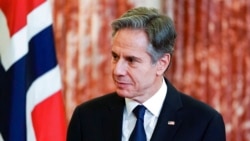The Biden administration’s first sanctions designations on North Korea are a largely symbolic move that will have little impact on the regime’s human rights practices or its nuclear weapons and missile programs, experts say.
Joshua Stanton, a Washington attorney who helped draft the North Korea Sanctions Enforcement and Policy Enforcement Act in 2016, said, “It’s a combination of modest and mostly symbolic actions that are tied to (the) world’s human rights.
“This was the Treasury Department’s way of saying that North Korea actually is of some significance” to U.S. efforts to highlight its human rights violations, Stanton continued.
North Korea is known for its repressive human rights practices, including forced labor and torture, particularly inside its notorious political prison camps.
Last Friday, the U.S. Department of Treasury’s Office of Foreign Assets Control (OFAC) designated North Korea-related entities and individuals connected to human rights abuses, including the country’s Central Public Prosecutor’s Office for holding unfair trials, and Ri Yong Gil, current minister of the People’s Armed Forces and former minister of Social Security, which operates prison camps.
Anthony Ruggiero, a senior fellow at the Foundation for Defense of Democracies, said the Biden administration probably felt it had “no other choice” but to include North Korea under its sanctions designations on Human Rights Day.
“The Biden administration must increase the pressure on the Kim regime by issuing sanctions on the DPRK’s proliferation activities to provide leverage for denuclearization negotiations,” Ruggiero said.
Also designated are European Institute Justo, a Moscow-based university, and its provost Demitriy Yurevich Soin for sponsoring student visas for North Korean workers whose income OFAC said could have been used to support Pyongyang’s weapons of mass destruction programs.
North Korea’s animation studio SEK Studio and related individuals and entities that facilitated payments for the regime are also blacklisted.
The Treasury Department also listed entities and individuals connected to human rights violations in China, Myanmar and Bangladesh.
The designations coincided with International Human Rights Day and the second day of the Summit for Democracy that President Joe Biden hosted to renew democratic values, including human rights, with more than 100 countries.
The Biden administration has prioritized human rights since taking office. Secretary of State Antony Blinken reiterated on Friday what he said about the administration’s emphasis on human rights in February.
The U.S. is “determined to put human rights at the center of our foreign policy,” Blinken said, as the State Department issued its own designations and travel bans on individuals connected with human rights violations.
Soo Kim, a former CIA analyst who is now with the RAND Corporation, said the sanctions will not have much impact on North Korean leader Kim Jong Un’s intention of developing nuclear weapons and missiles.
“This won’t deter Kim,” Soo Kim said. “Pyongyang’s nuclear weapons program is a permanent fixture that guarantees Kim’s survival. The regime will also find loopholes to evade sanctions. As such, for sanctions to really stick, we’ll need to target not only the North Koreans but its complicit aiders and abettors — third-party countries such as China, Russia, etc.”
China and Russia have often been accused of helping North Korea evade sanctions. They also have been pushing for sanctions relief for North Korea.
Ken Gause, director of Adversary Analytics at CNA, thinks imposing sanctions on North Korea will push the regime to rely more on China for its economic support and make it less inclined to give up its nuclear weapons and missile programs or to engage in nuclear talks.
“There’s really no more pressure you can put on them, because China’s sitting there and would blunt any pressure,” Gause said. “I don’t think there’s anything in the negative category or the pressure category that you can do. The only thing where there is potential is in the positive category, which is sanctions relief or some sort of incentives.”
Hours after the U.S. announced the designations, the Chinese embassy in Washington told VOA’s Korean Service that Beijing “opposes and strongly condemns” the U.S. move.
“The U.S. practice constitutes serious interference in China’s internal affairs, severe violations of basic norms governing international relations, and grave harm to China-U.S. relations,” embassy spokesperson Liu Pengyu said.
“We urge the U.S. to immediately rescind its wrong decision and stop making any remarks or moves that interfere in China’s internal affairs and undermine China’s interests,” he added.
VOA’s Korean Service requested comments from North Korea’s mission to the United Nations in New York but did not receive a reply.
Talks between the U.S. and North Korea have been stalled since October 2019.









